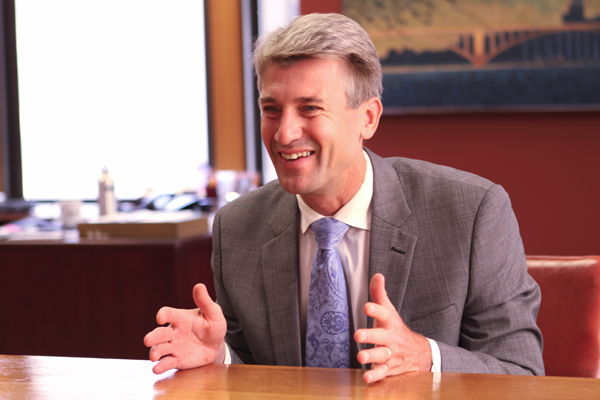
Local food fans who follow the news have probably noticed that Minneapolis Mayor R.T. Rybak isn’t afraid to stir the pot when it comes to making gastronomic policy. His aggressive promotion of clean local tap water through eye-catching drinking fountains and an online marketing campaign has riled the right-wing on the local and national level.
And his ambitious Homegrown Minneapolis initiative — while less controversial — may have game-changing power, uniting hundreds of stakeholders including neighborhood gardeners, farmers, policy makers, entrepreneurs, think tankers, and community activists.
Talking with Mayor Rybak, it soon becomes clear that he’s a guy who doesn’t get hung up on one particular issue — the complicated interplay of public health, physical infrastructure, and patterns of food distribution is more his speed.
The Heavy Table sat down with Mayor Rybak at City Hall this week to talk food policy, urban bees and chickens, water wars, and, of course, State Fair food favorites.
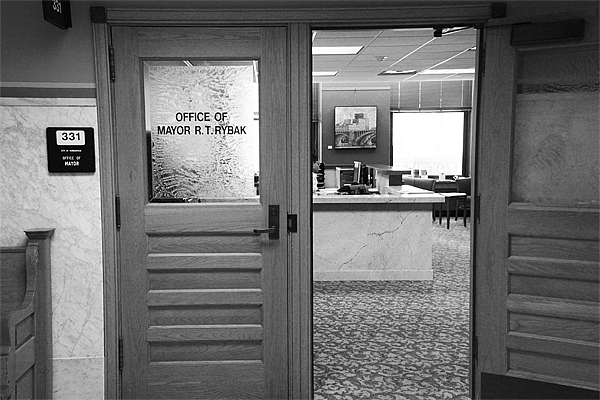
JAMES NORTON: What’s the genesis of Homegrown Minneapolis, and how has the project taken shape?
MAYOR R.T. RYBAK: Both my wife [Homegrown Minneapolis Steering Committee Co-Chair Megan O’Hara] and I care passionately about these issues. Well before I was mayor, we were gardenders, we were farmers market fanatics — two or three a weekend — and have always liked what we now would call local food, but used to call “farmers market food.”
Right when Omnivore’s Dilemma came out, my wife read it — and I didn’t have to read it, because she read me every single excerpt from it. But on a family vacation, a couple years ago, I read it… and it was the best way I ever saw to look at the food systems we have.
It brought together so many of the things we’d been working on: our love of local food and farmers markets, the work I do in my office about closing health disparities, the work we do on economic issues… it all began to come together.
Unfortunately, on the drive home, the bridge collapsed. That put us a back a little bit, but this year we really launched it.
What was so powerful about it, like so many good movements… you think you’re the only one and suddenly people are coming out of the woodwork. Megan and I are both thrilled by all that’s come about with this — more than 100 people volunteered.
We’ve been very influenced by Mark Ritchie and the Institute for Agriculture and Trade Policy and we follow their work very closely. Also Julie Ristau — she wrote a couple things for me about how a mayor’s office can get involved in food policy. She’s been talking about that since I came into office [in 2001].
NORTON: It strikes me as unusual to have a mayor’s office so involved in food policy like this… is that the case?

MAYOR RYBAK: There are bubbles of excitement in various local governments about this… and I know when I introduced a resolution at the US conference of mayors about local food, it was probably one of the most popular resolutions there. So many mayors are hearing pieces of this and they want to play a role.
But, totally selfishly, this is something Megan and I want to do for the place we live and the food we eat. There’s nothing more intimate than the food that we eat, but there are few things we know less about, as Americans, as we’re sitting at the table.
And how wonderful it was yesterday to have a going-away dinner for my daughter, who’s going to college — and my mom and my sister and her family were there… and we obviously cared about everybody at the table, a lot. All the food — well, the meat was from Thousand Hills [Cattle Company], the corn was from my favorite corn grower, and we knew where the tomatoes were from, and the cucumbers too… and watermelon was from the guy I’ve been buying from for years. When we share this thing called “food” with people who you love, it’s a wonderful expression to know where it all comes from.
That all sounds very lofty, and we don’t do it everyday, but I think the more we do that, the more those of us in a metropolitan area can use our buying power to lift the economy of the rest of the state.
NORTON: It’s that link between the rural and the urban that’s so key…
MAYOR RYBAK: Remember why Minneapolis is here. It’s home to the only natural waterfall on the Mississippi which was used to create power to turn this into the milling capital of the world. Grains from around the state came into the city, and we learned how to process them into products — and that’s when we got General Mills, and Pillsbury, and how we became such a disproportionately wealthy area, where so many people had educations, and access to the arts. It really goes back to the fact that the rural area is tied to the metro area and its consumer market here.
All we’re doing with Homegrown Minneapolis is building that connection between city and farm again.
NORTON: Tell me where the initiative stands right at this moment, and what sort of economic and social influence you see this initiative having.
MAYOR RYBAK: The first phase of Homegrown Minneapolis delivered a report that gave initiatives in many different areas: about what we do with our farmers market policy, to how we look at food disparity, to how we create economic opportunity — that’s gotten a lot of support within City Hall. So all these different tentacles are in different departments.
For example, our Health Department applied for and received a significant grant to implement parts of this — our Department of Community Planning and Economic Development is working on what it means to create community kitchens and business loans for small businesses.
It’s also looking at our policies around farmers markets and trying to encourage more local food at them, and trying to figure out sustainable management strategies, especially for community-based ones like Midtown and Kingfield.
So this is going to be implemented at many many different levels. It’s at the technical implementation phase, which is more complicated. But it’s exciting that we’re at the point where the ideas that the citizens had are being woven into the fabric of city government.
NORTON: What’s the back story on the city’s tap water initiative?
MAYOR RYBAK: People around me have been nervous about me pushing the water thing. Stop and think about this: Among the many things that city government does is that we run a multi-million dollar delivery system to bring water directly to your home.
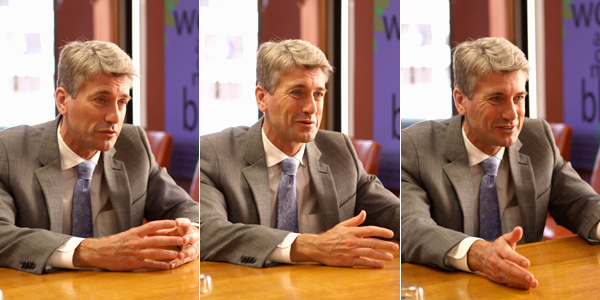
We’re in the business of water. And my job as CEO of the city is to run a number of things including this business called water. Water consumption has dropped dramatically in cities across the country.
Step back from this and consider that when water first came into cities, it was celebrated. The fountains you see in cities across America were really celebrating the fact that we finally had water coming into the city, so that you could drink clear, clean water — and, oh by the way, deal with sewage.
In this past decade, city tap water consumption has plummeted as people have switched to bottled water. There’s something deeply wrong with a system that takes bottled water from Fiji — which, by the way, has no public water system — and ships it halfway around the world in plastic which has to go into a landfill to people who could get quality water by simply turning on their tap. The system is ridiculous.
As someone who believes in us drinking a lot of water — as opposed to pop and a lot of the crap we put into our bodies — and is in charge of a multimillion dollar water system… I think we should stand up and celebrate the fact that we’ve got good water, better than what you can get out of the bottle.
So I launched a couple of initiatives — one was to simply market our water, because if we don’t, we’re going to continue to have fewer people using water. Let’s get out there and tell our story so people can understand why it’s important to invest in this.
NORTON: Why is it a critical priority, though?
MAYOR RYBAK: If a large portion of the population will only drink bottled water, it gets more difficult for government to get a consensus to keep the city water system up, and then you wind up in a situation where only those who can afford bottled water get it, and those who can’t get bad water systems.
Water is the most democratic — small “d” — action we have in our government. Everybody in the city can turn on the tap and get clean drinking water — it doesn’t matter how much you make. That’s a wonderful thing, but it takes an investment.
NORTON: I’ve read critics who come after the program saying: “We could be spending this money on police officers or firefighters…”
MAYOR RYBAK: For the record, you can’t. There are funds that are isolated that are just for water. 99.9% of that goes into the infrastructure that maintains the quality of our clear, clean water. A minuscule amount — I believe it was .06% — we allocated to marketing, including the very controversial drinking fountains. I used water money and money for public art together. Not a nickel of that could have been used for police officers.
I believe that .06% of the money that goes into water should be used to tell people why we drink it — we’re like a company that has a great product, but huge amounts of our product are back in the storeroom because people don’t know about it.
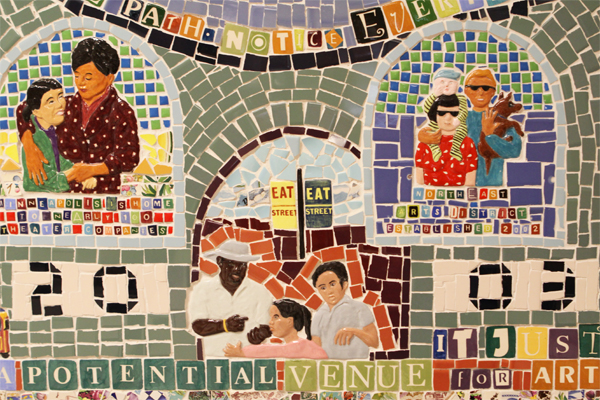
NORTON: Back to Homegrown Minneapolis for a moment. Could you give me a few of concrete manifestations of this initiative that we can expect to see over the next four or five years?
MAYOR RYBAK: Sure. Let’s start with farmers markets. We want to have EBT [Electronic Benefit Transfer] and other credits low income people use for food available at farmers markets. It’s nice that you can get Cheetos at a grocery store, but isn’t it better if you could get fresh produce?
The zoning for community gardens — right now, somebody can start a community garden on a piece of land we have a development viewpoint on, so we’re doing a comprehensive review of the city plan to identify places where people can grow community gardens. That’ll help us head off these tough conversations we have to have where residents develop a community garden, but it happens to be on a piece of land we’re developing — we want to be in front of that issue.
The part I find frankly the most exciting — well, second most exciting, after the food — is what kind of businesses we can start out of this. There’s a wonderful store called [Local] D’lish — that’s a great spot. You go in there and you begin to see how local businesses are beginning to grow around local food. And so what that’s doing is saying how people can take something they’re doing in the kitchen and turn it into a business.
We’re working with the Ackerberg Group and the Pohlad [Family] Foundation to do a project on Broadway that has a community kitchen.
I would love to have compost citywide, which is a goal of ours. I’m also hoping to do microgrants around this, so we can seed individual initiatives, like the one that emerged in North Minneapolis, on Glenwood, a community garden… which is wonderful!
I was there two weeks ago, and here are these kids who have been working on a community garden all summer, and now all their families have come for a banquet at the end of the summer.
And I’m not certain if all those families have been eating a lot of local food, but I know a lot of these kids didn’t have a clue where thing came from, and now they’re eating beans off the vine that taste great, that beat a potato chip for taste. And that small act means huge amounts for economic and health disparities.
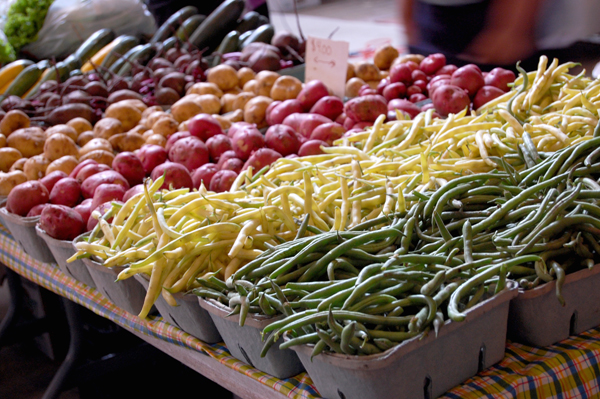
NORTON: What’s your perspective on bringing animal husbandry into the city — urban beekeeping and chicken keeping, for example?
MAYOR RYBAK: The primary goal of Homegrown Minneapolis is to create partnerships between people who live and consume in the metropolitan area with growers who live in the rest of the area. The city will never compete with rural Minnesota in terms of production, but it’s a good thing to have some options here.
One of those is honey and bees. We’re going to take each of these initiatives one at a time because they’re all very unique.
With bees, we took a look at that, and it became clear that more bees in the city will not only produce more honey but will help our landscape.
As for chickens… Well, I still have to hear some of the stuff on them.
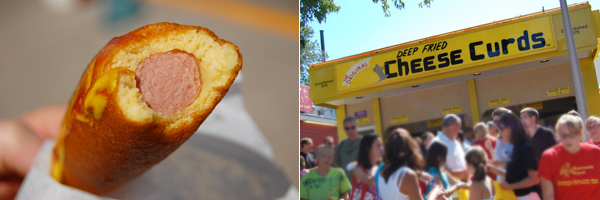
NORTON: The State Fair’s coming up — any food you’ve already got your eye on?
MAYOR RYBAK: I’m not above eating complete junk food at the Fair. I like corn dogs a lot. Gosh, fried green tomatoes. Those are great. There’s this ice cream there that’s some weird flash-frozen thing that’s great… I always go to Schumacher’s from New Prague, that’s where my family’s from, New Prague.
But what’s my favorite food at the State Fair? That’s like asking who is my favorite resident of Minneapolis. There’s a lot of them!

Great interview, Jim!
It’s exciting to see Minneapolis leadership take such a proactive approach to local food systems. That is where real change can be fostered and gain momentum.
The discussion about the water fountains is interesting; good to know the details behind funding. We’re fortunate to have such excellent drinking water in Minnesota, and I’m glad that’s being promoted.
Excellent interview!
Great interview. I am a chicken owned person in south Minneapolis. I volunteer as a Master Gardener at a number of local farmers markets. As a MG I have fielded a growing number of questions this year on growing food in the home garden. So many are concerned about their health, the safety of the food and the cost of that food- the total cost to our health, resources and quality of life. Please keep up the push for lots of safe local food and water. Every egg my girls produce is one more that did not have to get “trucked in”. Every tomato/bean/kale leaf that I harvest from my garden is that much less pressure on our resources. I am glad that beekeeping has been approved and wait on the approval for goats here in Minneapolis. This is a great city full of wonderful hardworking and ecologically minded people. We need the farmers markets, the community gardens, the restaurants featuring local food. This is part of what makes this such a great city. More chicken would be nice too! Perhaps Mayor, you would enjoy going on the “Coop Tour” on Sept 12th. It will feature local people who have chickens. C’mon and visit the coops!
Another excellent interview, and a reminder of how great RT has been for Minneapolis. I’d love to see him as Governor, but I’d miss him as my mayor.
@theresa r
Please send more info or a link about the Coop Tour! Anything via a search engine thinks I want Co-ops.
Coop tour Sept 12 10-4
http://sites.google.com/site/twincitiescooptour/
that should work
Does anyone have anything to say about the chemicals such as chlorine that are in the current tap water? There’s no way I want to drink chlorine, and that’s why a lot of people are buying bottled water. I do have a filter on my tap now and that takes out the chlorine, so that is what I drink . I don’t like the plastic taste in the bottled water either.
We are chicken keepers, and urban farmers with more than 1600 sq ft of farm land in North Minneapolis that produces over 500 lbs of produce every year and feeds our family through Winter. We would welcome Mayor Rybak to come and visit our farm and see what local food can be about and to talk about where it can go.
Devin Quince
We need someone like RT as Governor as he has a good grasp of the issues affecting food, farming and the environment in the State.
My opinion is the MN Dept of Ag is way too cozy with the AgChem industry and farmers and has little respect for the environment.
For example out in rural Mn during August, many farmers contracted to have Lorsban sprayed on their soybeans to fight spider mites or aphids during the soybean bloom.
Federal law prohibits insecticides to be sprayed on blooming plants LIKE SOYBEANS to protect pollinators. Long story short the system is complaint driven so unless hundreds or thousands of people called in and reported just about any farm supply, coop, contract sprayer or bean farmer across the state, the MDA appears to willingly let this travesty go on unimpeded and appear unwilling to enforce federal label laws on pesticides.
Any flying insect 10-15 feet above a recently sprayed soybean field with Lorsban will likely die as a result of the vapors during the 12-20 hours after application. California has already severely restricted the use of Lorsban. No wonder our pollinators are at risk everywhere. When was the last time you saw hundreds of butterflies or those yellow and white moths in late summer?
Who are the constituents of the MDA? Dow, Monstanto, Industrial Ag Inc? or the citizens, native insects, fish and animals of MN?
Pawlenty and Colin Peterson have at every opportunity chosen Industrial Ag Inc over the citizens and environment.
There’s also chlorine in bottled water. Fluoride, too. In fact, a lot of bottled water is just some other city’s tap water.
http://www.metromag.com/0p176a3304/something-in-the-water/
Excellent interview. This is the first I’ve heard of the water fountains, TapMpls, and the approval of beekeeping. Frankly, I’m impressed at the campaign that came out of a $180k investment. (By the way, I’m sure there are at the *very* least a number of agency folk, designers, and web programmers who don’t feel this money went “down the drain.” I just hope the campaign was by Minneapolis companies.)
I have more faith in the quality of Minneapolis tap water than I do bottled water, say nothing of BPA-emitting plastic bottles that wind up in a land fill. And the “I recycle, though!” argument doesn’t really help much, since recycling plastic will only require more expensive processes and more energy, thus more consumed fossil fuels.
You can also thank Minneapolis water for most of the good beers brewed at Barley John’s, Town Hall, and others. (And Great Waters, Summit and Flat Earth in St. Paul, whose water is also from the Mississippi.)